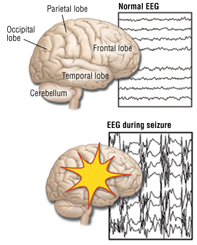Seizures

"Seizure" is a general term that refers to a sudden malfunction in the brain that causes someone to collapse, convulse. Not all seizures cause convulsions. There are many types of seizures and some have mild symptoms. Seizures fall into two main groups. Focal seizures, also called partial seizures, happen in just one part of the brain. Generalized seizures are a result of abnormal activity on both sides of the brain. Seizures are caused by abnormal electrical discharges in the brain or by fainting (decrease in blood flow to the brain). Symptoms may vary depending on the part of the brain involved, but often include unusual sensations, uncontrollable muscle spasms, and loss of consciousness. Some seizures may be the result of another medical problem, such as low blood sugar, infection, a head injury, accidental poisoning, or drug overdose. They also can be due to a brain tumor or other health problem affecting the brain. And anything that results in a sudden lack of oxygen or a reduction in blood flow to the brain can cause a seizure.When seizures occur more than once or over and over, it may indicate the ongoing condition epilepsy.
Treatment
Treatment for seizures may involve surgery or medication.
If epilepsy seizures are due to a tumor, abnormal blood vessels, or bleeding in the brain, surgery to treat these disorders may make the seizures stop. Anticonvulsants, may reduce the number of future seizures. Always take your medication on time and as directed. Missing a dose can cause you to have a seizure. Never not stop taking or change medications without talking to your doctor first.
 Alzheimer's Disease
Alzheimer's Disease